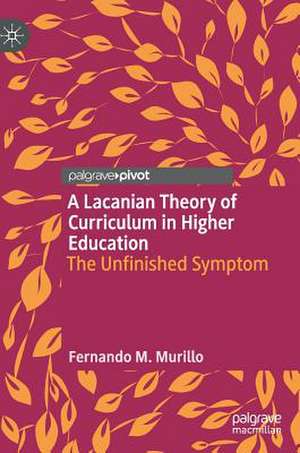A Lacanian Theory of Curriculum in Higher Education: The Unfinished Symptom
Autor Fernando M. Murilloen Limba Engleză Hardback – 17 oct 2018
Preț: 415.39 lei
Nou
Puncte Express: 623
Preț estimativ în valută:
79.50€ • 82.12$ • 66.16£
79.50€ • 82.12$ • 66.16£
Carte tipărită la comandă
Livrare economică 25 martie-08 aprilie
Preluare comenzi: 021 569.72.76
Specificații
ISBN-13: 9783319997643
ISBN-10: 3319997645
Pagini: 86
Ilustrații: IX, 92 p. 1 illus.
Dimensiuni: 148 x 210 mm
Greutate: 0.28 kg
Ediția:1st ed. 2018
Editura: Springer International Publishing
Colecția Palgrave Pivot
Locul publicării:Cham, Switzerland
ISBN-10: 3319997645
Pagini: 86
Ilustrații: IX, 92 p. 1 illus.
Dimensiuni: 148 x 210 mm
Greutate: 0.28 kg
Ediția:1st ed. 2018
Editura: Springer International Publishing
Colecția Palgrave Pivot
Locul publicării:Cham, Switzerland
Cuprins
Chapter 1. Introduction.- Chapter 2. The Formation of the Subject: Curriculum as an Unfinished Symptom.- Chapter 3. Critique: Between Theory and Method.- Chapter 4. Analyzing Symptoms in Policy: A Psychoanalytic Reading.- Chapter 5. Concluding Thoughts.
Notă biografică
Fernando M. Murillo holds a PhD in Curriculum Studies from the University of British Columbia, Canada. His current work focuses on education, psychoanalysis, and German educational theory and philosophy.
Textul de pe ultima copertă
This volume presents a distinctively Lacanian psychoanalytic approach to the theorizing, understanding, and critique of curriculum in higher education. In this work, the author presents the main theories of curriculum in the current discourse, develops a notion of critique, and applies it to existing global guidelines for curriculum reform. Relying on the architectonic of the subject as developed across the work of Jacques Lacan—expressed in the registers of the Symbolic, the Imaginary, and the Real—the author provides a new approach to understanding curriculum in terms of the psychic dynamics that explain its workings.
Caracteristici
Fills a gap in existing literature by providing a specifically Lacanian theoretical frame to understanding curriculum Proposes a psychoanalytic curricular critique as a form of research in education Develops a methodological approach to educational criticism in psychoanalytic terms
